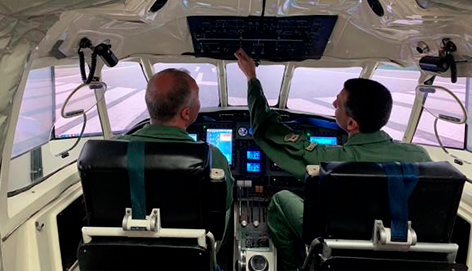Training and development in the qualification of new pilot and use of digital simulator
DOI:
https://doi.org/10.22480/revunifa.2024.37.541Keywords:
Flight simulator, training, performanceAbstract
The objective of this research was to analyze the effects provided by training and development programs applied to new intelligence, surveillance and reconnaissance aviation (IVR) pilots of the 1st/5th Aviation Group (GAV) using the simulator C-95M, that was implemented in the 1st half of 2019 at the Natal Air Base. For the collection of information, secondary data were initially obtained referring to the flight records of pilots enrolled in the Aviation Operational Specialization Course for Intelligence, Surveillance and Reconnaissance (CEO-IVR), specifically for the flight simulator and advanced instrument phases, in the period between 2017 and 2020. Then, the flight grades of the students were analyzed to measure the effect provided by the training and development programs researched and that were applied to the new pilots of the 1st/5th GAV using the C- 95M The technique of simple linear regression was used for each one of the variables studied and in an isolated way to verify which one of them influenced the performance of the pilots after the adoption of the implemented training techniques. The results found suggested that the training methods adopted had positive effects on the pilots' psychomotor performance. It is concluded, therefore, that the findings of this research will contribute as a theoretical and empirical basis for the conduction of actions that allow the development of desirable skills for the training of pilots in carrying out the CEO-IVR.
References
ABBAD, Gardênia da Silva et al. Medidas de Avaliação em Treinamento, Desenvolvimento e Educação: Ferramentas para gestão de pessoas. Artmed Editora, v. 1, 2012.
ALLERTON, D. J. The impact of flight simulation in aerospace. The Aeronautical Journal, v. 114, n. 1162, p. 747-756, 2010.
BARSZCZ, Piotr; WESOLOWSKI, Mariusz; BLACHA, Krzysztof. Management of trainings with use of flight simulators in compliance with characteristic parameters of equipment. Prace Naukowe Instytutu Technicznego Wojsk Lotniczych, v. 37, n. 1, p. 95, 2015.
BORIL, Jan et al. Aviation simulation training in the Czech air force. In: 2015 IEEE/AIAA 34th Digital Avionics Systems Conference (DASC). IEEE, 2015. p. 9A2-1-9A2-13.
BORIL, Jan; JIRGL, Miroslav; JALOVECKY, Rudolf. Use of flight simulators in analyzing pilot behavior. In: IFIP International Conference on Artificial Intelligence Applications and Innovations. Springer, Cham, 2016. p. 255-263.
BURROW, J., & BERARDINELLI, P. (2003). Systematic performance improvement – Refining the space between learning and results. Journal of Workplace Learning, 15(1), 6–13.
COSTA, Jorge Armando Marques de. A importância dos simuladores na formação de pilotos e CTA's e seu impacte na segurança de voo. 2008. Tese de Doutorado.
FROEHLICH, Cristiane; SCHERER, Carlos Ernesto. Treinamento e desenvolvimento: um estudo de caso na empresa LLV metalúrgica situada no rio grande do sul. Revista de Gestão do UNILASALLE, Canoas, v. 2, n. 2, 2013. Disponível em: <https://revistas.unilasalle.edu.br/index.php/desenvolve/article/view/1160. Acesso em: 17 mar. 2021>.
KIRKPATRICK, Donald L. Another Look at Evaluating Training Programs: Fifty Articles from Training & Development and Technical Training: Magazines Cover the Essentials of Evaluation and Return-on-investment. United Kingdom: Amer Society for Training & Development, f. 129, 1998.
KIRKPATRICK, Donald L.; KIRKPATRICK, James D.; LAMENSDORF, Jose
Henrique. Como Avaliar Programas de Treinamento de Equipes: os quatro níveis.1 ed. Rio de Janeiro: Senac, f. 194, 2010. 388 p.
MACHADO, Jefferson E. S. Aviação e história: Os primórdios dos simuladores de voo. 2016 Disponível em: http://www2.fab.mil.br/musal/index.php/projeto-av-hist/62- projeto-avhist/470-os-primordios-dos-simuladores-de-voo. Acesso em: 20 mai. 2021.
MARRAS, Jean Pierre. ADMINISTRAÇÃO DE RECURSOS HUMANOS: do operacional ao estratégico. 15. ed. Saraiva, 2016. 352 p.
MACHADO, Jefferson E. S. Aviação e história: Os primórdios dos simuladores de voo. 2016 Disponível em: http://www2.fab.mil.br/musal/index.php/projeto-av-hist/62- projeto-avhist/470-os-primordios-dos-simuladores-de-voo. Acesso em: 20 mai. 2021.
MENESES, Pedro; ZERBINI, Thais; ABBAD, Gardênia. Manual de Treinamento Organizacional. 1. ed. Artmed Editora, v. 1, f. 85, 2010.
MORENO, M. Simulador de vôo de helicópteros: uma visão econômica. Rev. UNIFA, Rio de Janeiro: dez 2003.
PANASSOL JUNIOR, J. C..; GARCIA, C. M. VOO DE INSTRUÇÃO: IMPORTÂNCIA DO USO DE SIMULADOR DE VOO PARA A FORMAÇÃO DE PILOTO. Revista Brasileira de Aviação Civil & Ciências Aeronáuticas, [S. l.], v. 1, n. 2, p. 164–191, 2021. Disponível em: https://rbaccia.emnuvens.com.br/revista/article/view/29. Acesso em: 29 dez. 2021.
SIQUEIRA, Marcelo Costa. Gestão Estratégica da Informação. Rio de Janeiro: Basport, 2005

Downloads
Published
Issue
Section
License
Copyright (c) 2024 André Luís Monteiro Tomaz, Laís Karla da Silva Barreto, Joyce Mariella Medeiros Cavalcanti, Marcelo Victor Alves Bila Queiroz, Rui Fernando Correia Ferreira, Éder Miranda da Silva

This work is licensed under a Creative Commons Attribution-NonCommercial 4.0 International License.
Revista da UNIFA permite que o (s) autor (es) mantenha(m) seus direitos autorais sem restrições. Atribuição-NãoComercial 4.0 Internacional (CC BY-NC 4.0) - Revista da UNIFA é regida pela licença CC-BY-NC








